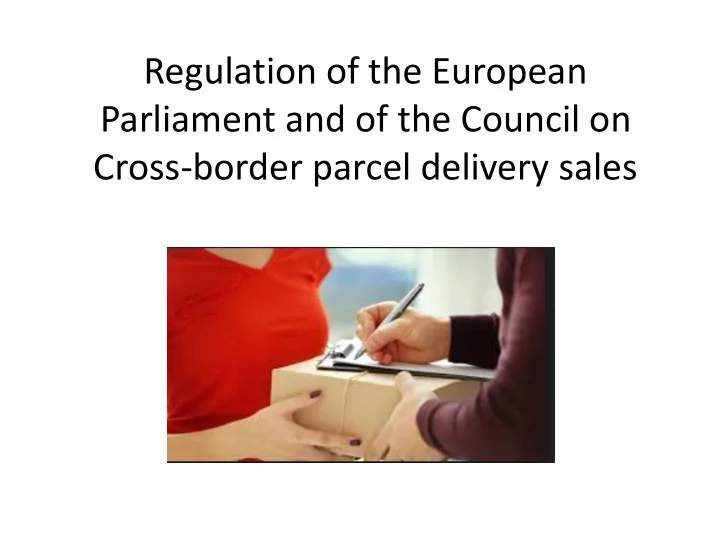

Regulation of the European Parliament and of the Council on Cross-border parcel delivery sales
E-commerce in Europe • 15% of consumers bought online from other EU Countries • 44% bought online in their own country • 84% of online sales in 2014 came from the country in which the selling company was located. 415 billion € (0.27%) : Potential Contribution to EU GDP of achieving a fully functioning Digital Single Market (European Parliament Study)
DSM Strategy measures to tackle hurdles to online trading: • Tackling Unjustified Geo-discrimination based on residence and nationality • Harmonising consumer contract rules for online and other distance sales of goods and the supply of digital content • Review of the regulation of the Consumer Protection Cooperation.
Public Consultation MAY – AUGUST 2015 361 Responses received
Problems reported by Businesses • High prices (within the EU cross-border prices charged are 3 to 5 times higher to domestic equivalent). • Ineffective inconsistent or inexistent regulatory oversight creates obstacles to the single market. • Lack of information about the parcel delivery market including available delivery services, providers and prices. • E-retailers charge their customers more for delivery than they pay themselves.
Problems reported by consumers • - Uncertainty or lack of choice of date and time of delivery - Prices • Smaller companies unsatisfied with prices of delivery services • National Postal Operators – System Interoperability could improve delivery services • Delivery operators – Competition would lead to progress
Objectives of this regulation • Make markets work more effectively by- a) making the regulatory oversight of the parcels markets more effective and consistent b) encouraging competition • Increase transparency of tariffs in order to a) reduce unjustifiable tariff differences b) lower the tariffs paid by individuals and small businesses, especially in remote areas
Provision of Information All Parcel Delivery Providers to submit to NRAs: • Annual turnover in parcel delivery services for the previous calendar year in the MS in which the provider is established (broken down in parcel delivery services relating to national, incoming and outgoing cross-border postal items). • Number of persons working for the provider in the provision of parcel delivery services • Breakdown of annual amount of parcels handled
Article 4: Transparency of tariffs and terminal rates Universal service providers to provide the national regulatory authority of the MS with the public list of tariffs (Annex 1) on the 1 st January of each year. NRAs to submit public list of tariffs to Commission. (To be published) USPs to provide the NRAs with the terminal rates applicable on the 1 st January of each calendar year to postal items originating from other Member states NRAs to submit terminal rates obtained to the Commission. (Not to be published)
Assessing affordability of tariffs • NRAs to assess the affordability of cross- border tariffs included in the public lists of tariffs obtained based on domestic tariffs and terminal rates. NRAs to send assessment to the Commission • Commission will publish non-confidential version of the assessment
Transparent and non-discriminatory cross-border access • USPs concluding Multilateral agreements on terminal rates shall meet all reasonable requests for access • Access to cover relevant services and information systems, necessary for the provision of cross-border parcel delivery services.
MALTA POSITION Malta generally supports the EU Commission’s goal to reduce the retail prices and cost of parcel delivery services and which would boost e-commerce. Malta is actively participating in discussions on this dossier to contribute towards a workable solution that would be practical for operators, regulators and consumers. This dossier is expected to feature during our Presidency and it is a considered a priority dossier for Malta.
Recommend
More recommend